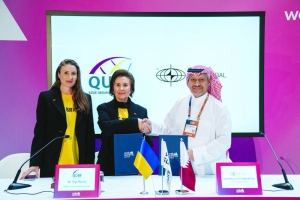UNDP and Qatar Partner to Harness Digital Innovation for Sustainable Development | Headlines

At the 2024 Doha Forum, themed “The Innovation Imperative”, the United Nations Development Programme (UNDP) and the State of Qatar, represented by the Ministry of Communications and Information Technology (MCIT), signed a Memorandum of Understanding (MoU) to promote digital innovation as a catalyst for sustainable development.
This agreement highlights the critical role of digital technologies in driving inclusive growth, improving access to essential services, and empowering global communities. It commits both parties to prioritize support for nations most in need, leveraging digital tools to bridge divides and accelerate sustainable progress.
A Commitment to Global Progress
“Qatar recognizes the transformative power of digital technology to create opportunities, enhance inclusion, and drive sustainable development on a global scale,” said H.E. Mr. Mohammed bin Ali Al Mannai, Qatar’s Minister of Communications and Information Technology. “This collaboration with UNDP underscores our commitment to collectively harnessing digital innovation that benefits communities worldwide.”
H.E. Al Mannai emphasized the shared vision of bridging the digital divide and ensuring that technological advancements contribute to equitable growth.
Achim Steiner, UNDP Administrator, echoed these sentiments, stating: “The digital divide remains one of the greatest challenges of our time, perpetuating inequalities and hindering progress. This partnership with Qatar represents a vital step toward empowering communities by providing the skills and resources needed to thrive in the digital age.”
Building on Past Success
The collaboration builds on the achievements of previous Partnership Framework Agreements (2019–2023) between UNDP and the Qatar Fund for Development. It aims to advance innovative digital initiatives, particularly in the context of the United Nations’ Global Digital Compact and the 20-year review of the World Summit on the Information Society (WSIS).
The MoU aligns with Qatar’s strategic vision outlined in its Digital Agenda and Qatar National Vision 2030, which seek to position the country as a leader in digital technology, innovation, and sustainability. Hosting events like the World Summit AI 2024 and Web Summit 2025 further demonstrates Qatar’s commitment to fostering a vibrant digital ecosystem that drives knowledge exchange and economic diversification.
Transformative Goals
The partnership will focus on:
Digital Capacity Building: Equipping individuals and institutions with the skills necessary for effective digital transformation.
Innovative Solutions: Developing technology-driven responses to global challenges.
Research and Thought Leadership: Promoting responsible and impactful use of digital technologies.
Digital Access and Literacy: Expanding technology access and education to underserved communities.
Achim Steiner emphasized the role of artificial intelligence and other digital tools as accelerators for progress, highlighting the need for global cooperation to maximize impact.
“Together, we can create a future where technology serves as a force for equitable growth and development, leaving no one behind,” Steiner added.
Positioning Qatar as a Global Digital Leader
This collaboration also cements Qatar’s position as a global digital innovation hub, reflecting its dedication to advancing sustainable development through technology. With its strategic initiatives and hosting of prominent tech forums, Qatar aims to inspire global partnerships that leverage digital transformation to address pressing challenges and foster inclusive growth worldwide.
Related
QUBF launches ‘Qatar-Ukraine Tech and Innovation Committee’
Dr Olga Revina, chairperson of QUBF, and Sheikh Mansoor bin Khalifa al-Thani, fou
Initiative to support digital innovation in Qatar launched
Assistant Undersecretary for Digital Industry Affairs at MCIT Reem Al Mansoori, and General Manager of Microsoft Qatar Lana Khalaf exchanging documents after s
MCIT, Microsoft Sign Partnership Initiative to Support Digital Innovation and…
As part of its efforts to enhance digital innovation and support the growth of startups in the country, the Ministry of Communications and Information Technolog
IIA Qatar hosts session on tech-driven transformation in internal audit
Officials pose during the seminar hosted by Institute of Internal Auditor Qatar Chapter. Doha, Qatar: The Institute of Internal Auditor Qatar Chapter r












